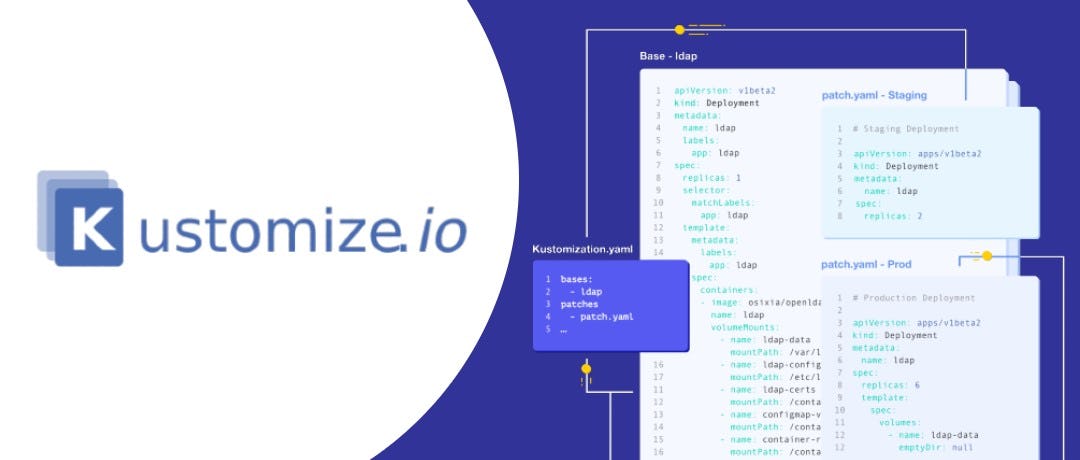With Kustomize we will be able to manage easily multiple K8S YML files for multiple configurations. It will act like a YML files merger which will be easier to manage a real world application or infrastructure.
Prerequisites and objectives
You should have followed the Kubernetes(K8S) Workshop - Part 1 or have basic knowledge of Kubernetes in a declarative way.
Let's do it
Install Kustomize
$ brew install kustomize
We may use a file structure like so :
.
└── k8s
└── kustomize
├── base
│ ├── kustomization.yml
│ ├── deployment.yml
│ └── service.yml
└── overlays
├── dev
│ ├── kustomization.yml
│ └── additional.yml
├── int
│ └── kustomization.yml
├── qa
│ └── kustomization.yml
└── prd
└── kustomization.yml
Important part here is the concept of base and overlays, we can define default K8S object in base and customize them for our multiple environments. We can eventually add specific object to one environment, for example in dev we may need to handle more thing than on a real environment.
Important files are kustomization.yml in each sub folders. It's important to respect the filename but It can be .yml or .yaml
Use kustomize
- Create folders and file like the schema above (no need to create all env).
mkdir -p k8s/kustomize/base
mkdir -p k8s/kustomize/overlays/dev
mkdir -p k8s/kustomize/overlays/prd
touch k8s/kustomize/base/kustomization.yml
touch k8s/kustomize/base/deployment.yml
touch k8s/kustomize/base/service.yml
touch k8s/kustomize/overlays/dev/kustomization.yml
touch k8s/kustomize/overlays/dev/mongodb.yml
touch k8s/kustomize/overlays/prd/kustomization.yml
Base
# k8s/kustomize/base/kustomization.yml
apiVersion: kustomize.config.k8s.io/v1beta1
kind: Kustomization
resources:
- deployment.yml
- service.yml
# k8s/kustomize/base/deployment.yml
apiVersion: apps/v1
kind: Deployment
metadata:
name: nginx-deployment
spec:
replicas: 2
selector:
matchLabels:
app: nginx
template:
metadata:
labels:
app: nginx
spec:
containers:
- name: nginx
image: nginx:1.7.9
ports:
- containerPort: 80
# k8s/kustomize/base/service.yml
apiVersion: v1
kind: Service
metadata:
name: nginx
spec:
type: ClusterIP
selector:
app: nginx
ports:
- protocol: TCP
port: 80
targetPort: 80
Dev
# k8s/kustomize/overlays/dev/kustomization.yml
apiVersion: kustomize.config.k8s.io/v1beta1
kind: Kustomization
resources:
- ../../base
- mongodb.yml
# k8s/kustomize/overlays/dev/mongodb.yml
apiVersion: apps/v1
kind: Deployment
metadata:
name: mongodb-deployment
spec:
replicas: 1
selector:
matchLabels:
name: mongodb
template:
metadata:
labels:
name: mongodb
spec:
containers:
- name: mongodb
image: mongo:4.2.8
ports:
- containerPort: 27017
Prd
# k8s/kustomize/overlays/prd/kustomization.yml
apiVersion: kustomize.config.k8s.io/v1beta1
kind: Kustomization
resources:
- ../../base
We define all our base ressources and we use kustomization.yml file to include them. For overlays we relatively include the base.
We can now build files with kustomize to see the result
$ kustomize build k8s/kustomize/overlays/dev
It outputs a single YML file with all our resources defined (separated with ---).
apiVersion: v1
kind: Service
metadata:
name: nginx
spec:
ports:
- port: 80
protocol: TCP
targetPort: 80
selector:
app: nginx
type: ClusterIP
---
apiVersion: apps/v1
kind: Deployment
metadata:
name: mongodb-deployment
spec:
replicas: 1
selector:
matchLabels:
name: mongodb
template:
metadata:
labels:
name: mongodb
spec:
containers:
- image: mongo:4.2.8
name: mongodb
ports:
- containerPort: 27017
---
apiVersion: apps/v1
kind: Deployment
metadata:
name: nginx-deployment
spec:
replicas: 2
selector:
matchLabels:
app: nginx
template:
metadata:
labels:
app: nginx
spec:
containers:
- image: nginx:1.7.9
name: nginx
ports:
- containerPort: 80
We can apply them if we want.
$ kustomize build k8s/kustomize/overlays/dev | kubectl apply -f -
Now let's try to override some configurations.
# k8s/kustomize/overlays/prd/kustomization.yml
apiVersion: kustomize.config.k8s.io/v1beta1
kind: Kustomization
resources:
- ../../base
patchesStrategicMerge:
- deployment-prd.yml
- Create a new file
k8s/kustomize/overlays/prd/deployment-prd.ymland we will override some value of our base deployment.
# k8s/kustomize/overlays/prd/deployment-prd.yml
apiVersion: apps/v1
kind: Deployment
metadata:
name: nginx-deployment
spec:
replicas: 5
selector:
matchLabels:
app: nginx
template:
metadata:
labels:
app: nginx
spec:
containers:
- name: nginx
resources:
requests:
memory: "512Mi"
cpu: "250m"
limits:
memory: "1024Mi"
cpu: "1000m"
We changed for example the the number of replicas and we set some resources allocation and limits.
- Build It again
kustomize build k8s/kustomize/overlays/prd
apiVersion: v1
kind: Service
metadata:
name: nginx
spec:
ports:
- port: 80
protocol: TCP
targetPort: 80
selector:
app: nginx
type: ClusterIP
---
apiVersion: apps/v1
kind: Deployment
metadata:
name: nginx-deployment
spec:
replicas: 5
selector:
matchLabels:
app: nginx
template:
metadata:
labels:
app: nginx
spec:
containers:
- image: nginx:1.7.9
name: nginx
ports:
- containerPort: 80
resources:
limits:
cpu: 1000m
memory: 1024Mi
requests:
cpu: 250m
memory: 512Mi
We can also change the docker image version nginx:1.7.8 instead of nginx:1.7.9
# k8s/kustomize/overlays/prd/kustomization.yml
apiVersion: kustomize.config.k8s.io/v1beta1
kind: Kustomization
resources:
- ../../base
patchesStrategicMerge:
- deployment-prd.yml
images:
- name: nginx
newTag: 1.7.8
This can be also done with command line (inside the overlay folder)
kustomize edit set image nginx:1.7.8
$ kustomize build k8s/kustomize/overlays/prd
apiVersion: v1
kind: Service
metadata:
name: nginx
spec:
ports:
- port: 80
protocol: TCP
targetPort: 80
selector:
app: nginx
type: ClusterIP
---
apiVersion: apps/v1
kind: Deployment
metadata:
name: nginx-deployment
spec:
replicas: 5
selector:
matchLabels:
app: nginx
template:
metadata:
labels:
app: nginx
spec:
containers:
- image: nginx:1.7.8
name: nginx
ports:
- containerPort: 80
resources:
limits:
cpu: 1000m
memory: 1024Mi
requests:
cpu: 250m
memory: 512Mi
Thanks to kustomize we can now handle and merge YML files easily, It offers other features that you may want like :
Another useful option is generatorOptions, like so, you can disable the suffix generation when applying files (eg: my-secret-34bfD will be my-secret)
kind: Kustomization
apiVersion: kustomize.config.k8s.io/v1beta1
# It's a good practice to add the namespace to kustomization files
# It can prevent you to apply accidentally namespaced object to the wrong one, in case of wrong context
# I usually do It once, in base/kustomization.yml
namespace: my-namespace
resources:
- my-deployment.yaml
generatorOptions:
disableNameSuffixHash: true

